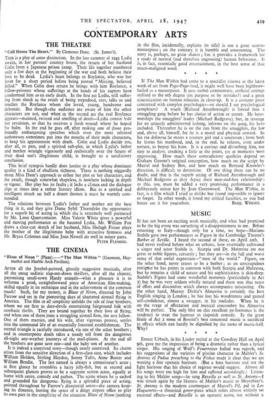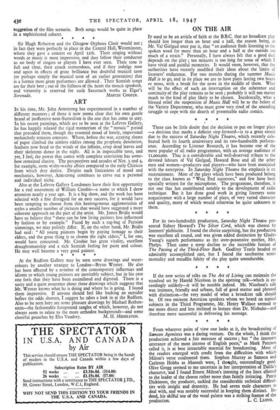MUSIC
IT has not been an exciting week musically, and what had promised to be the big event was something of a disappointment to me. Before returning to Italy—though only for a time, we hope—Mariano Stabile gave two performances as Figaro in the Cambridge Theatre's Barber of Seville. I heard the second of these, on April toth. I had never realised before what an urbane, how essentially cultivated a singer and actor Stabile is. Scarpia and Dr. Malatesta are not great or noble figures, certainly ; but they are—in the full and worst sensc of that awful expression—" men of the world." Figaro, on the other hand, never ceases to be a barber ; as an unscrupulous intriguer he has points in common with both Scarpia and Malatesta, but he remains a child of nature and his sophistication is skin-deep. Stabile's Figaro had some wonderful moments (particularly in Act 3) but he was very seldom wholly natural and there was that sense of effort and discomfort which always accompanies miscasting. On the other hand, Murray Dickie's Almaviva is certainl3 the best English singing in London ; he has lost his woodenness and gained self-confidence, almost a swagger, in his roulades. When he is on the verge of affectation and musical coxcombry his Almaviva will be perfect. The only blot on this excellent performance is the tendency to treat the humour as slapstick comedy. In the great finale of Act 2 some of Rossini's best concerted music is sacrificed to effects which can hardly be dignified by the name of music-hall. Why?
* * * *
Ernest Urbach, in his Lieder recital at the Cowdray Hall on April 9th, gave me the impression of being a dramatic rather than a lyrical singer. His singing of Wolf's Feuerreiter ballad was superb, and his suggestions of the varieties of piscine character in Mahler's St. Antony of Padua preaching to the Fishes made it clear that we are wasting a fine operatic baritone. (But a bass baritone and not the light baritone that his choice of register would suggest. Almost all his songs were too high for him and suffered accordingly.) Listen- ing to his Mahler songs—he sang Reveille as well as St. Antony—I was struck again by the likeness of Mahler's music to Meyerbeer's. St. Antony is the modern counterpart of Marcel's Pif, paf in Les Huguenots—a theatrical genre-piece which relies almost entirely on external effects—and Reveille is an operatic scena, not without a
suggestion of the film scenario. Both songs would be quite in place in a sophisticated cabaret. * * * * Sir Hugh Roberton and the Glasgow Orpheus Choir would not ; in fact they were perfectly in place in the Central Hall, Westminster, where they gave a concert on April 12th. Their singing without words or music is most impressive, and they follow their conductor as no body of singers or players I have ever seen. Their tone is full and clear, their attack tremendous, and if they indulge now and again in effects of great brilliance but doubtful musical taste (or perhaps simply the musical taste of an earlier generation) that is a licence most great performers are allowed . Their Scottish songs are far their best ; out of the fullness of the heart the mouth speaketh, and virtuosity is reserved for such Sassenach works as Elgar's



































 Previous page
Previous page